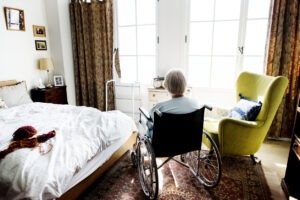Nursing homes should be places of comfort and care for those in their golden years. However, each year, thousands of nursing home residents suffer from neglect and abuse in facilities across the country, including right here in Boston. It’s a heartbreaking reality that leaves families feeling helpless and outraged.
If your loved one has been victimized, a Boston nursing home abuse lawyer could fight for your rights and hold the at-fault party accountable. At Jason Stone Injury Lawyers, our Boston personal injury lawyers are standing by and ready to partner with you in your case.
Contact us today for a free consultation. There’s no obligation, just information.
What Can You Sue a Nursing Home for?
Nursing homes and similar facilities are entrusted with the care and safety of individuals who can no longer care for themselves at home. If a nursing home resident is injured or passes away due to neglect, abuse, or negligence on the part of the medical team or staff, the facility and individuals are liable and can be sued for damages.
Although no amount of money can truly compensate you for nursing home abuse, a monetary settlement can ease the financial burden that often accompanies these unfortunate situations. Financial compensation can also ease the minds of those involved by holding the responsible parties accountable and receiving justice for the victim.
Personal Injury Cases
- Medical treatment costs
- Pain and suffering
- Emotional distress
- The cost of finding a new care facility
Wrongful Death Lawsuits
If the abuse or neglect in a nursing home is severe enough and can be proven to be the cause of the death of a resident, a Boston wrongful death lawyer could help you seek:
- Funeral expenses
- Burial costs
- Medical expenses occurring before death
- Pain and suffering
Family members should watch for signs of abuse, report it if they see it, and then contact a personal injury attorney for help. Holding nursing homes accountable for their actions is an important step in reducing physical abuse and neglect.
How Long does It Take to Settle a Nursing Home Lawsuit?
Elder abuse claims start with the victim or the victim’s family contacting a Boston nursing home abuse lawyer. An initial consultation will help the law firm evaluate whether or not there is an abuse case. If an attorney concludes that there is indeed a case, legal action should begin immediately.
What Is the Claims Process Like?
- Investigation and filing: Your nursing home abuse attorney will need the facts of the case along with any evidence you may have. Documents, including medical records, legal contracts, and police reports, will be gathered. Photographic evidence and any witness statements will also be included. Your attorney can then file a lawsuit.
- Discovery: Your attorney will share the facts and evidence of your case with the opposing legal team and be allowed access to the information the defendant has as well. This allows both parties to prepare the case for trial and formulate legal strategies.
- Negotiating fair compensation: Arriving at a settlement agreement before a case goes to court can save time and extra expenses. If a settlement can be reached and it is in the victim’s best interest, the case can come to an end at this stage.
- Taking the case to court: If the insurance company refuses to agree to fair compensation, your attorney will represent you in court. A judge and, in some cases, a jury will decide your case’s outcome.
Every situation is different, and while no law firm can predict exactly how long the process will take, it is in everyone’s best interest to complete the process as quickly as possible. If you’re wondering what to do if you suspect abuse, an attorney can guide you through your next steps.
Proving Care Facility Negligence
Elderly residents of care facilities are some of the most vulnerable citizens in our population. All rely, to some extent or another, on the care they receive from the staff and medical personnel hired by the facility. This vulnerability can make proving nursing home negligence more difficult, which underscores the importance of hiring a lawyer.
Proving neglect requires evidence. Police reports, medical reports, images of bruises or other injuries, witness statements, and testimony from the abuse or neglect victim can all serve as proof of misconduct.
Emotional abuse may be harder to prove, but it is no less important. Family members can document evidence of emotional abuse or neglect. Testimony of a loved one’s depression, fear, withdrawal, lack of social interaction, and sudden declining mental state can support the important claim of emotional abuse.
What Constitutes Neglect in a Nursing Home?
Nursing home staff members have a responsibility to provide adequate and reasonable care to their residents. Neglect differs from abuse in that it involves failing to provide what a resident needs. Conversely, abuse is when someone acts to inflict harm on a resident.
Neglect can be purposeful or unintentional, and the effects can be physical suffering or emotional or psychological trauma. All forms of neglect are subject to legal action and leave the care facility vulnerable to lawsuits.
Common types of abuse or neglect include the following:
- Lack of medical and dental care
- Not addressing mental health needs
- Financial abuse
- Sexual abuse
- Medication errors
- Inadequate personal hygiene, bathing, changing clothes, and toileting
- Lack of food or hydration
- Rapid weight loss
- Lack of mobility assistance
- Preventable falls
- Unexplained injuries
- Verbal abuse
- Bed sores, aka pressure ulcers
- Not responding to residents’ requests for assistance
Nursing home neglect can be criminal, depending on its severity. If you suspect a loved one is experiencing abuse in a care facility, call authorities immediately to ensure your family member is safe, and then contact our firm.
Massachusetts Nursing Home Regulations
In Massachusetts, nursing facilities must adhere to both state and federal guidelines through specific regulations covering a broad spectrum of administrative matters.
Admissions
When admitting new patients, nursing homes must comply with stringent regulations, particularly concerning financial matters.
The key points of these regulations include:
- Prohibition against demanding third-party payment guarantees
- Ensuring patients’ freedom to select their pharmacy and physician
- Prohibition against imposing attorney fees on residents
- Prohibition against coercing residents into waiving the facility’s liability
- Limiting non-refundable deposits to an amount not exceeding one month’s care costs
Additionally, nursing homes in Massachusetts are prohibited from discriminating against potential residents based on their payment source.
Resident Transfers
Nursing homes must refrain from transferring residents between distinct areas unless there is a valid cause. Residents have the right to challenge any proposed transfers, including relocations from a unit certified for Medicare to one lacking this certification.
In general, nursing homes are authorized to transfer or discharge residents under the following circumstances:
- When the resident is no longer in need of the nursing home’s care
- If the resident’s continued stay poses a risk to the safety or health of other residents
- When the nursing home ceases its operations
- If the resident no longer pays for the services rendered by the facility
Facility Re-Admissions
Nursing home facilities in Massachusetts are often responsible for readmitting residents who have temporarily left to stay at a hospital. However, re-admission is contingent upon certain conditions. For example, residents must be medically stable and still in need of care within a nursing home setting.
It is also important to note that additional regulations may govern the process of nursing home readmission, ensuring compliance with all relevant standards and protocols.
Bed Holding
Residents are entitled to reclaim their beds following a period of absence, whether for medical or non-medical purposes. Typically, Massachusetts facilities are required to reserve a bed for residents for ten days.
Reporting Misconduct
In compliance with Massachusetts regulations, nursing homes are mandated to display information regarding the Patient Abuse Law prominently. This notice must be visible on every floor and accessible to the public, patients, and residents.
Additionally, the displayed information should outline patient abuse regulations and provide guidance on reporting any suspected incidents of the following:
- Abuse
- Neglect
- Mistreatment
- Misappropriation
Individuals with concerns are encouraged to report such issues directly to the Department of Public Health.
Understanding Duty of Care for Nursing Homes
Nursing homes have a duty of care to their residents, which means they have a legal obligation to provide a safe and nurturing environment. This duty of care includes ensuring the physical, emotional, and psychological well-being of their residents. It requires facilities to provide adequate staffing levels, maintain proper hygiene standards, and prevent any form of abuse or neglect.
Understanding the duty of care for nursing homes is crucial when seeking justice for your loved ones. By holding nursing homes accountable for their actions or lack thereof, you can help prevent future instances of abuse and ensure the safety of all residents.
It’s important to consult with a Boston lawyer who has experience in nursing home abuse cases. We can provide you with the guidance and support you need to navigate the legal system and protect your loved one’s rights. Together, we can work towards ensuring that care facilities uphold their duty of care and provide the level of care and support that all residents deserve.
How Long do You Have to Sue for Financial Compensation?
In Massachusetts, the statute of limitations for nursing home abuse is generally three years from the date the abuse or neglect was discovered or reasonably should have been discovered.
It’s important to note that this time limit can vary depending on the specific circumstances of the case. It’s crucial to seek legal representation to ensure that you meet all necessary deadlines and protect your loved one’s rights.
After an incident of abuse, before you talk to someone from an insurance company on your own, better phone Stone. We’re available day and night, even on weekends, to provide advice via phone, text, email, and video meetings.
How Can You Help a Loved One Who Has Experienced Elder Abuse in a Care Facility?
If you suspect that a loved one is experiencing nursing home abuse, it’s important to take action and provide them with the support they need.
Here are some tips to help you navigate this difficult situation:
- Listen and believe: The first step is to listen to your loved one and believe what they are telling you. Many abuse victims feel ashamed or afraid to speak out, so it’s crucial to create a safe and supportive environment for them to share their experiences.
- Document and report: Document any signs or evidence of abuse, including injuries, changes in behavior, or suspicious actions by caregivers or staff. Report elder abuse to the appropriate authorities so that they can investigate the situation and take appropriate action.
- Provide emotional support: Offer your loved one emotional support and reassurance. Let them know that they are not alone and that you are there to help them through this difficult time. Encourage them to seek counseling or therapy to process their emotions and heal from the trauma.
- Seek legal assistance: Consult with an attorney. They can provide you with guidance on legal options, such as obtaining restraining orders or filing a civil lawsuit against the abuser or the facility responsible for the abuse.
- Ensure their safety: If necessary, consider relocating your loved one to a safe environment where they will be protected from further abuse. This may involve finding a new living arrangement or seeking support from local resources, such as assisted living facilities or home care services.
Remember, abuse in a nursing home is a serious issue that should never be ignored. By following these tips, you can help your loved one navigate through this challenging situation and ensure their safety and well-being.
Preventing Future Abuse
Nursing home abuse is a tragic and all-too-common issue that occurs across the country. It is our duty as a society to prevent future instances of abuse and ensure the safety and well-being of our loved ones in these facilities.
In order to prevent future nursing home abuse, several steps can be taken:
Raise Awareness
First and foremost, it is essential to raise awareness about the issue and educate the public about the signs of abuse. By being informed, we can better recognize the red flags and take appropriate action.
Staff Training and Supervision
Nursing homes themselves must also be held accountable for providing a safe and nurturing environment for their residents. This starts with proper staffing levels and ensuring that employees are well-trained and knowledgeable about elder care. Regular training and supervision can help prevent instances of abuse and neglect.
Background Checks
In addition, implementing rigorous background checks for employees can help identify individuals with a history of abuse or neglect and prevent them from working in nursing homes. Strict policies and procedures must be in place to address any concerns or complaints promptly and thoroughly.
Regular Inspections
Regular inspections and oversight by government agencies are crucial to ensuring that nursing homes are meeting the required standards of care. It is important for families and loved ones to stay involved in their loved one’s care and regularly check in on their well-being.
What to Expect from Our Law Firm
When you hire Jason Stone Injury Lawyers, we’ll assign a dedicated legal team to your case to make sure all your needs are being met. Your legal team is assigned based on your situation to ensure a good fit.
Your case manager will be responsible for handling all aspects of your nursing abuse claim. An associate attorney will also be assigned to your case. This lawyer evaluates the evidence and determines the best course of action to maximize your compensation.
All of our nursing home neglect attorneys collaborate with Jason Stone and each other to evaluate your case’s strengths and weaknesses and come up with strategies to build a compelling, evidence-based case.
Contact Us for Your Nursing Home Abuse Case in Boston, MA
Nursing home abuse is a devastating reality that thousands of elderly individuals face each year. But there is hope. By seeking justice with the help of a Boston nursing home abuse lawyer, you can hold those responsible accountable and fight for the rights of victims of nursing home abuse.
At Jason Stone Injury Lawyers, we take nursing home negligence cases on a contingency fee basis, meaning you never have to reach into your pocket to pay us. We only get paid if you do; that’s a part of our Stone Cold Guarantee®.
Together, we can create a society where long-term care facilities are places of comfort, care, and dignity for our elderly population. Don’t hesitate to take action and seek the justice your loved ones deserve. Contact us today to get started with a free, no-obligation consultation.
Not Trusting What You’re Being Told?
Better Phone Stone
800-577-5188
 START MY NO OBLIGATION CONSULTATION
START MY NO OBLIGATION CONSULTATION










